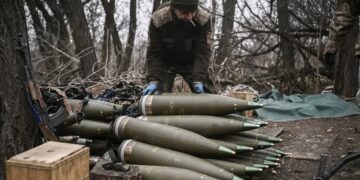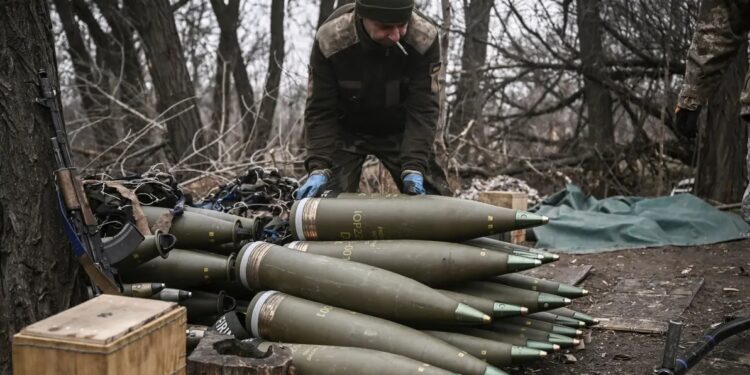By John Ikani
German Defence Minister Boris Pistorius has cautioned that the EU’s commitment to deliver one million artillery shells to Ukraine by March 2024 may not be fulfilled.
In a pivotal move last March, the EU pledged to provide Kyiv with a million 155-mm shells within a year, a decision hailed as historic.
Throughout the conflict with Russia, Ukrainian forces have frequently expressed concerns about shortages of essential supplies.
President Volodymyr Zelensky revealed that a delayed summer counter-offensive was partly due to insufficient weapons and materials.
Reports from Ukrainian officials earlier this year indicated that Russian forces were firing 25,000-30,000 shells daily, a rate up to four times higher than Ukraine’s military capacity.
Twenty-five EU member states, along with Norway, swiftly endorsed an agreement to expedite the provision of additional ammunition to Ukraine through the European Defence Agency, symbolizing solidarity with Kyiv and sending a strong message to the arms industry.
The pledged shells were supposed to be sourced from existing stockpiles and joint purchases, marking a departure from the traditional approach of individual EU countries making autonomous defence decisions.
Minister Pistorius clarifies that he personally did not commit to a million shells, acknowledging earlier scepticism about the feasibility of such an ambitious goal: “These warning voices have now been proven right, unfortunately.”
Ukraine’s Foreign Minister, Dmytro Kuleba, acknowledges the EU’s political will to assist but points to bureaucratic hurdles and challenges such as “the inadequate state of the defence industry, ammunition production capacity, depots, and the ability to secure external contracts.”
Josep Borrell, the EU’s foreign policy chief, attributes the shortfall to a lack of production capacity, advocating for a shift in priorities within Europe’s defence industry, suggesting a reduction in the export of 40% of its products to other countries.
NATO Secretary General Jens Stoltenberg notes the increased production efforts by Western allies, including the UK and US, expressing optimism about Germany and other EU countries enhancing their contributions.
In September, the Pentagon announced the production of 28,000 shells monthly, with plans to double output to 57,000 by next spring, aiming to support Ukraine’s counter-offensive and replenish US stockpiles.
President Zelensky issued a warning on Tuesday, highlighting intensified Russian attacks on the front line, specifically around Donetsk, Kupyansk, and Avdiivka in the east.
“Avdiivka, a strategically vital town overlooking Russian-held Donetsk, still houses over 1,500 civilians, though every building in the town has been damaged,” according to Vitaliy Barabash, the head of Avdiivka’s military administration.
In a separate incident, the governor of Ukraine’s southern Kherson region reports three fatalities and 15 injuries resulting from Russian shelling on Tuesday.

































